Reports by Randi Solhjell
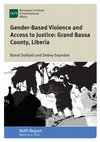
Liberia has a dual justice system: there is a formal court hierarchy under the judiciary (i.e. a ... more Liberia has a dual justice system: there is a formal court hierarchy under the judiciary (i.e. a statutory justice system), as well as a system of customary courts. In this project, we examine the issue of gender-based violence (GBV) in relation to these two systems. This report is based on fieldwork in Grand Bassa County, and builds on qualitative data (interviews and focus groups) and quantitative data (survey). The survey showed that the majority of respondents (96%) have access to forms of local justice, i.e. a justice system that is affordable and nearby. This also corresponds well with our qualitative data.
We have identified various challenges as well as potentials with both the customary and the statutory justice systems as regards GBV. First, the statutory system remains largely unavailable to the majority of the Liberian population, for reasons that include costs, travel distance, language and cultural barriers. That being said, the statutory system offers a more standardized procedure, with the potential of ensuring a more gender-equal form of justice compared to many of the customary systems. On the other hand, the customary systems are far more readily available, and are also efficient in handling various kinds of cases. However, there are also limitations, including the perceived low legitimacy of traditional authorities among youth as well as among influential organizations and institutions that support international human rights approaches, as women are often subordinate to men in the traditional institutions.
Both system have many potentials. The authorities in charge of customary law acknowledge their limitations in handling GBV cases, and many are also motivated to include perspectives from youth and women in today’s Liberia. As the customary systems are available and affordable to most of the populace, there is much to be said for empowering and strengthening their roles and also improving communication with the statutory system. The statutory system is overburdened and could benefit from stronger working relations with the customary system.

This report focuses on the integration of gender perspectives in military and peacekeeping operat... more This report focuses on the integration of gender perspectives in military and peacekeeping operations. It examines operative issues from the viewpoints of men and women to identify differences in needs and priorities, as well as in abilities and potential to contribute to the success of the mission, as identified in UN Security Council Resolution 1325 (2000). Gender in this report refers to the social attributes and opportunities associated with being male or female, and the relations between women and men, girls and boys. As to the integration of gender perspectives in military operations, we examine issues from the point of view of men as well as women in order to identify differences in needs and priorities, as well as in abilities and potential to contribute to mission success.
The comparative study examines UN operations in Haiti (MINUSTAH), Liberia (UNMIL) and the DR Congo (MONUSCO) in addition to the Norwegian contribution to the NATO operation in Afghanistan. Although more research is needed, the findings provide documentation on progress and gaps on the implementation aspect of Resolution 1325 regarding the incorporation of gender perspectives at field level. In particular, the project has looked into the terms of mandate and training aimed at implementing and operationalizing these tasks and reaching the entire population. Moreover, as there is nothing to indicate that in the near future a more equal number of women and man will be used and deployed to international operations, it is important that the male soldiers and military staff have an awareness of their surroundings in terms of gender perspectives. This means that, for instance, in their daily activities like patrolling and reporting in UN missions they should be aware of the situation for both women and men, and that they liaise with a community representative who can give gendered details of various security concerns.
United Nations Security Council Resolution 1325 on Women, Peace and Security was hailed as a pion... more United Nations Security Council Resolution 1325 on Women, Peace and Security was hailed as a pioneering step in acknowledging the varied roles of women in conflict and promoting their participation in peace processes and in peacebuilding. This report takes a critical look at the inclusion and exclusion of Res. 1325 in peace operations in Africa. It focuses on the meaning and importance of gender perspectives in these operations rather than "women's perspectives."
NUPI Security in Practice No. 7, Sep 9, 2010
The report addresses the UN mission in Chad (MINURCAT) and the Chadian police force DIS in the co... more The report addresses the UN mission in Chad (MINURCAT) and the Chadian police force DIS in the context of protecting civilians against sexual and gender-based violence (SGBV) in eastern Chad.
Policy briefs by Randi Solhjell
The UN Civilian Capacities (CivCap) initiative is a response to rebuilding countries in transitio... more The UN Civilian Capacities (CivCap) initiative is a response to rebuilding countries in transition from war to peace. This policy brief focuses on gender-sensitivity in this initiative and the UN's ability to support this development.
humansecuritygateway.com
Sexual violence has been endemic to warfare in the Democratic Republic of Congo (DRC) over the pa... more Sexual violence has been endemic to warfare in the Democratic Republic of Congo (DRC) over the past decade, and the international community has focused considerably on measures to address this issue. Most prominent is United Nations Security Council Resolution 1820 ( ...
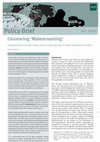
The United Nations Security Council Resolution 1325 on Women, Peace and Security (2000) was haile... more The United Nations Security Council Resolution 1325 on Women, Peace and Security (2000) was hailed as a path-breaking step in acknowledging the various roles of women in conflict and promoting their participation in peace processes and in peace-building. Moreover, both before and after this resolution, there has been a push for integrating gender perspectives in all UN activities. This policy brief takes a critical look at the inclusion and exclusion of Resolution 1325 and the agenda of integrating gender perspectives in peace operations in Africa.
First, it is argued that the meaning of gender perspectives is usually equated with adding women in these operations. The peace operations in Africa are no doubt male dominated as they have on average 3% women in uniform (police and military), and about 29% international and 17 % local women among the civilian staff. However, only focusing on the number of women in peace operations is not sufficient.
Hence, the brief discusses some of the more qualitative aspects of gender perspectives in these operations, namely gender mainstreaming and gender units. It is argued that there is both a potential with these units in ensuring gender mainstreamed approaches through these units but also the challenges of creating separate units that are de facto ‘in charge of’ gender perspectives. Rather than gender mainstreamed, there is a tendency in these operations gender malestreaming: the male and masculine dominate the areas of security sector reform including the army, strengthening of state institutions and rule of law.
Gender mainstreaming is often viewed as a process that should fit the already existing structures or institutions rather than challenging these structures that have kept silent on gender in the first place. It is argued that the masculine discourses within such institutions (army and other state-building aspects) combined with the dilemmas of insecurity in the operative context are central to the analysis of and bottlenecks to gender mainstreaming and gender-sensitive approaches. Thus, gender mainstreaming and implementation of Res. 1325 will remain at a rhetorical level if there are not major changes to the masculine, militarized architecture of peace operations.
It is recommended that the UN peace operations should devote more time in gender mainstreaming the UN institution as this may be the first step of reform.
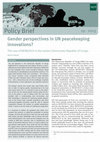
The UN Operation in the Democratic Republic of Congo (MONUSCO) has experienced some military vict... more The UN Operation in the Democratic Republic of Congo (MONUSCO) has experienced some military victories, as exemplified by the recent defeat of the M23 rebel group. MONUSCO has also instigated some crucial innovative measures aimed at improving its peacekeeping and protection practices. This policy brief examines three such innovations – the Community Liaison Assistants (CLAs), Community Alert Networks (CANs) and Joint Protection Teams (JPTs) in South Kivu province – with a critical discussion of some challenges of gender mainstreaming in these approaches and potential measures.
The findings indicate that several areas need further attention in order to improve gender mainstreaming at the local and mission level. First, it is essential to draw on the experience of the CLAs for internal gender training within the mission at the civilian as well as military level. The CLAs have excellent skills in understanding local communities, and their knowledge is important for improving gender perspectives at the mission level. Secondly, experiences with these community-targeted innovations could be used to improve cooperation between UN sections on gender perspectives, where it seems to be low levels of institutional cooperation.
It is important to address the gendered roles within communities that obstruct or enable the possibilities of security changes, not least the passivity of men who now rarely leave their homes and their stakeholder roles as formal and traditional representatives. One could say that Congolese men or unable to fulfill their masculine roles as breadwinners and heads of household. Moreover, there is a need to address the gap between what gender issues entail and how this affects the regular liaison work and reporting mechanisms of CLAs and JPTs. A focus on gender issues does not mean working also with women, but rather working with the entire society and understanding how actors and their institutions are informed and reproduced by gender relations in society, and in turn how these relations facilitate or obstruct the desired outcomes.

NUPI Policy Brief No. 3, Jun 2010
After only two years of deployment, the UN Mission in the Central African Republic and Chad (MINU... more After only two years of deployment, the UN Mission in the Central African Republic and Chad (MINURCAT) will, at the request of the Government of Chad, start its drawdown and exit by 31 December this year. MINURCAT will hand over its main tasks to Chad and the UN agencies present. These responsibilities include security of refugees, IDPs and humanitarian workers in eastern Chad, and continued support to the 850-strong Chadian police/gendarme
force, the Détachment Intégré de Securité (DIS), established to provide physical protection in eastern Chad, so far trained and mentored by MINURCAT. Will Chad be able to provide necessary security and take on the wider responsibility of protection, to prevent relapse into conflict and, most crucially, enable IDPs to return? On the whole, the new mandate would seem to be a bad deal for the international community. It will continue to finance
MINURCAT with 1900 troops in Chad who mostly stay in their camps and civilian sections without access to IDP returnee areas, due to the limited capacity for escorts and patrols of the host government. There is a high risk that eastern Chad, which
was on its way to early recovery, may again become a humanitarian crisis. The key benchmark – the return of a critical mass of IDPs – had been within striking distance. It now seems an elusive goal.
Book chapters by Randi Solhjell
Davies, S. et al. (eds.) The Responsibility to Protect: A Principle for the Women, Peace and Security Agenda, Aug 2013
Articles by Randi Solhjell
Internasjonal Politikk
ABSTRACT
Relaciones Internacionales
A Licencia CC-NC-ND
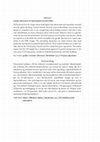
Gender Discourses in International Security Policy IR feminists have to a large extent challenged... more Gender Discourses in International Security Policy IR feminists have to a large extent challenged male-dominated and masculine-oriented security policy thinking. United Nations Security Council Resolution 1325 (2000) has played an important role in our recognizing and including women's and men's roles and contributions on issues relating to peace and security. However, there is a gap between the feminist IR contribution and international security policy and practice. Based on experience in the field, this article exemplifies the gender discourses in a peace operation in the DRC Congo. The prevailing discourses are about women who need protection and women as potential peacemakers. These representations are a more sel-lable idea to the UN Security Council and the militarized peace operations. The author argues that the UN largely has a malestreamed approach to gender perspectives in the core areas of UN operations, namely in militarized protection and state-building. Key words: gender | security | discourse | Resolution 1325 | UN peace operations
Sammendrag Feministisk tradisjon i IR har utfordret mannsdominert og maskulin sikkerhetspoli-tisk tenkning. FNs sikkerhetsrådsresolusjon 1325 (2000) har spilt en viktig rolle for å anerkjenne og inkludere kvinner og menns ulike roller og bidrag i spørsmål knyttet til fred og sikkerhet. Det er imidlertid et stort gap mellom feministisk IR-diskurs og prak-sis i internasjonal sikkerhetspolitikk. Jeg eksemplifiserer dette med feltarbeidserfarin-ger fra FN-operasjonen i Den demokratiske republikken Kongo og viser at kjønnsdiskursen i stor grad begrenser seg til kvinner som trenger beskyttelse og som potensielle fredsskapere. Dette er en mer salgbar idé blant et maskulint sikkerhetsråd og i FNs militaere fredsoperasjoner. Kjernevirksomheten i FN-operasjoner, militarisert beskyttelse og statsbygging, er sett på som ikke-kjønnet og danner de viktigste makt-strukturene i en FN-operasjon. Med andre ord tar FN i stor grad en malestreamed til-naerming til kjønnsperspektiver. Nøkkelord: kjønn | sikkerhet | diskurs | Resolusjon 1325 | FNs fredsbevarende operasjoner
Gendered Military Operations? The cases of NATO and UN missions in Afghanistan and DR Congo
It is well acknowledged that women and men, girls and boys are both actors in and victims of war ... more It is well acknowledged that women and men, girls and boys are both actors in and victims of war and post-conflict situations. Military and peace operations reflect these gender dynamics and gender equality less in their missions.

Seksualisert vold i Kongo, 2009
The purpose of this article is to discuss at different levels why soldiers in the Democratic Repu... more The purpose of this article is to discuss at different levels why soldiers in the Democratic Republic of Congo (DRC) have commited sexually violent acts towards civilians in the war since 1996 and in the ongoing conflict since 2003. The discussion is divided into three overlapping levels consisting of the individual , the group and the macro level. Foot soldiers in the DRC live at subsistence levels and use civilians as livelihood for their own survival. Women in the DRC are the livelihood as well as a symbol of wealth for Congolese men. Because of this women are kidnapped and kept as sex slaves and " bush wives ". Studies have shown that the government soldiers (FARDC) explain their sexually violent behaviour as an outlet for frustration and anger towards their superiors and their life situation. The fighting between armed groups over land mixed with tribes from areas in the eastern DRC is a crucial component of the warfare. This, combined with limited social and political attachment to the local population, legitimates sexual torture of the population to terrorize people into fleeing areas. Secondly, sexual torture is often combined with killings, looting and destruction of property making it difficult for people to return to areas to which they once belonged. Militant groups have thus successfully conquered new areas. At a macro level, committing crimes against humanity, where sexual violence is a useful weapon, makes military unpro-fessional groups a security threat and thus creates the possibility to access political and economic negotiations.

"Helping states to fulfill their duty to protect their citizens and those seeking refuge within t... more "Helping states to fulfill their duty to protect their citizens and those seeking refuge within the sovereign terrain of the given state belongs to the second pillar of the Responsibility to Protect (R2P). The R2P concept, however, relates as much to preventing mass atrocities as to halt already on-going ones. This article emphasises the gender dimensions of prevention of and protection against violence and other threats, in order to stress the importance of implementing and mainstreaming gender into R2P. The case study of interest here is the UN support mission to Chad and the Central African Republic (MINURCAT) that provided a fairly encouraging, albeit short-lived, example of gender-responsive prevention and protection measures at the community level for refugees and IDPs in eastern Chad. Chad exemplifies
a case with low-intensity conflicts and responses made at the local level, like the MINURCAT-supported community conflict resolution initiative, proved constructive in preventing violent responses. Here, deliberate integration of female police officers was a first step towards facilitating contact with women not allowed to talk to male strangers. Further, ensuring gender training for the entire police unit as an integrated part of their protection responsibility helped in avoiding male-as-norm approaches. The forced withdrawal of the UN was questioned as premature. However, the security situation has remained fairly stable, and the government seems able to provide at least some of the more hard-end forms of protection measures, although rule of law and other forms of protection for vulnerable groups remain elusive in eastern Chad. "
Papers by Randi Solhjell
Until 2013, the International Security and Stabilisation Support Strategy in the Democratic Repub... more Until 2013, the International Security and Stabilisation Support Strategy in the Democratic Republic of Congo focused mainly on infrastructure and the training and deployment of police officers. This did not result in more stability. The strategy has been criticised for providing technical solutions to political problems. The revised strategy engages communities and authorities at local and national level in dialogues in order to identify causes and develop solutions to conflicts. It provides the first coherent and thorough approach to stabilisation in DRC, an exit strategy for MONUSCO and an opportunity for learning for other UN operations.
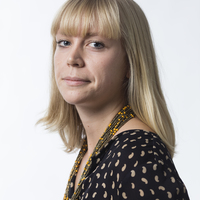






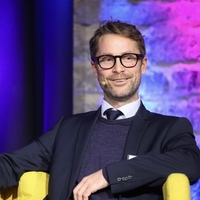
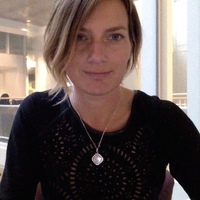

Uploads
Reports by Randi Solhjell
We have identified various challenges as well as potentials with both the customary and the statutory justice systems as regards GBV. First, the statutory system remains largely unavailable to the majority of the Liberian population, for reasons that include costs, travel distance, language and cultural barriers. That being said, the statutory system offers a more standardized procedure, with the potential of ensuring a more gender-equal form of justice compared to many of the customary systems. On the other hand, the customary systems are far more readily available, and are also efficient in handling various kinds of cases. However, there are also limitations, including the perceived low legitimacy of traditional authorities among youth as well as among influential organizations and institutions that support international human rights approaches, as women are often subordinate to men in the traditional institutions.
Both system have many potentials. The authorities in charge of customary law acknowledge their limitations in handling GBV cases, and many are also motivated to include perspectives from youth and women in today’s Liberia. As the customary systems are available and affordable to most of the populace, there is much to be said for empowering and strengthening their roles and also improving communication with the statutory system. The statutory system is overburdened and could benefit from stronger working relations with the customary system.
The comparative study examines UN operations in Haiti (MINUSTAH), Liberia (UNMIL) and the DR Congo (MONUSCO) in addition to the Norwegian contribution to the NATO operation in Afghanistan. Although more research is needed, the findings provide documentation on progress and gaps on the implementation aspect of Resolution 1325 regarding the incorporation of gender perspectives at field level. In particular, the project has looked into the terms of mandate and training aimed at implementing and operationalizing these tasks and reaching the entire population. Moreover, as there is nothing to indicate that in the near future a more equal number of women and man will be used and deployed to international operations, it is important that the male soldiers and military staff have an awareness of their surroundings in terms of gender perspectives. This means that, for instance, in their daily activities like patrolling and reporting in UN missions they should be aware of the situation for both women and men, and that they liaise with a community representative who can give gendered details of various security concerns.
Policy briefs by Randi Solhjell
First, it is argued that the meaning of gender perspectives is usually equated with adding women in these operations. The peace operations in Africa are no doubt male dominated as they have on average 3% women in uniform (police and military), and about 29% international and 17 % local women among the civilian staff. However, only focusing on the number of women in peace operations is not sufficient.
Hence, the brief discusses some of the more qualitative aspects of gender perspectives in these operations, namely gender mainstreaming and gender units. It is argued that there is both a potential with these units in ensuring gender mainstreamed approaches through these units but also the challenges of creating separate units that are de facto ‘in charge of’ gender perspectives. Rather than gender mainstreamed, there is a tendency in these operations gender malestreaming: the male and masculine dominate the areas of security sector reform including the army, strengthening of state institutions and rule of law.
Gender mainstreaming is often viewed as a process that should fit the already existing structures or institutions rather than challenging these structures that have kept silent on gender in the first place. It is argued that the masculine discourses within such institutions (army and other state-building aspects) combined with the dilemmas of insecurity in the operative context are central to the analysis of and bottlenecks to gender mainstreaming and gender-sensitive approaches. Thus, gender mainstreaming and implementation of Res. 1325 will remain at a rhetorical level if there are not major changes to the masculine, militarized architecture of peace operations.
It is recommended that the UN peace operations should devote more time in gender mainstreaming the UN institution as this may be the first step of reform.
The findings indicate that several areas need further attention in order to improve gender mainstreaming at the local and mission level. First, it is essential to draw on the experience of the CLAs for internal gender training within the mission at the civilian as well as military level. The CLAs have excellent skills in understanding local communities, and their knowledge is important for improving gender perspectives at the mission level. Secondly, experiences with these community-targeted innovations could be used to improve cooperation between UN sections on gender perspectives, where it seems to be low levels of institutional cooperation.
It is important to address the gendered roles within communities that obstruct or enable the possibilities of security changes, not least the passivity of men who now rarely leave their homes and their stakeholder roles as formal and traditional representatives. One could say that Congolese men or unable to fulfill their masculine roles as breadwinners and heads of household. Moreover, there is a need to address the gap between what gender issues entail and how this affects the regular liaison work and reporting mechanisms of CLAs and JPTs. A focus on gender issues does not mean working also with women, but rather working with the entire society and understanding how actors and their institutions are informed and reproduced by gender relations in society, and in turn how these relations facilitate or obstruct the desired outcomes.
force, the Détachment Intégré de Securité (DIS), established to provide physical protection in eastern Chad, so far trained and mentored by MINURCAT. Will Chad be able to provide necessary security and take on the wider responsibility of protection, to prevent relapse into conflict and, most crucially, enable IDPs to return? On the whole, the new mandate would seem to be a bad deal for the international community. It will continue to finance
MINURCAT with 1900 troops in Chad who mostly stay in their camps and civilian sections without access to IDP returnee areas, due to the limited capacity for escorts and patrols of the host government. There is a high risk that eastern Chad, which
was on its way to early recovery, may again become a humanitarian crisis. The key benchmark – the return of a critical mass of IDPs – had been within striking distance. It now seems an elusive goal.
Book chapters by Randi Solhjell
Articles by Randi Solhjell
Sammendrag Feministisk tradisjon i IR har utfordret mannsdominert og maskulin sikkerhetspoli-tisk tenkning. FNs sikkerhetsrådsresolusjon 1325 (2000) har spilt en viktig rolle for å anerkjenne og inkludere kvinner og menns ulike roller og bidrag i spørsmål knyttet til fred og sikkerhet. Det er imidlertid et stort gap mellom feministisk IR-diskurs og prak-sis i internasjonal sikkerhetspolitikk. Jeg eksemplifiserer dette med feltarbeidserfarin-ger fra FN-operasjonen i Den demokratiske republikken Kongo og viser at kjønnsdiskursen i stor grad begrenser seg til kvinner som trenger beskyttelse og som potensielle fredsskapere. Dette er en mer salgbar idé blant et maskulint sikkerhetsråd og i FNs militaere fredsoperasjoner. Kjernevirksomheten i FN-operasjoner, militarisert beskyttelse og statsbygging, er sett på som ikke-kjønnet og danner de viktigste makt-strukturene i en FN-operasjon. Med andre ord tar FN i stor grad en malestreamed til-naerming til kjønnsperspektiver. Nøkkelord: kjønn | sikkerhet | diskurs | Resolusjon 1325 | FNs fredsbevarende operasjoner
a case with low-intensity conflicts and responses made at the local level, like the MINURCAT-supported community conflict resolution initiative, proved constructive in preventing violent responses. Here, deliberate integration of female police officers was a first step towards facilitating contact with women not allowed to talk to male strangers. Further, ensuring gender training for the entire police unit as an integrated part of their protection responsibility helped in avoiding male-as-norm approaches. The forced withdrawal of the UN was questioned as premature. However, the security situation has remained fairly stable, and the government seems able to provide at least some of the more hard-end forms of protection measures, although rule of law and other forms of protection for vulnerable groups remain elusive in eastern Chad. "
Papers by Randi Solhjell
We have identified various challenges as well as potentials with both the customary and the statutory justice systems as regards GBV. First, the statutory system remains largely unavailable to the majority of the Liberian population, for reasons that include costs, travel distance, language and cultural barriers. That being said, the statutory system offers a more standardized procedure, with the potential of ensuring a more gender-equal form of justice compared to many of the customary systems. On the other hand, the customary systems are far more readily available, and are also efficient in handling various kinds of cases. However, there are also limitations, including the perceived low legitimacy of traditional authorities among youth as well as among influential organizations and institutions that support international human rights approaches, as women are often subordinate to men in the traditional institutions.
Both system have many potentials. The authorities in charge of customary law acknowledge their limitations in handling GBV cases, and many are also motivated to include perspectives from youth and women in today’s Liberia. As the customary systems are available and affordable to most of the populace, there is much to be said for empowering and strengthening their roles and also improving communication with the statutory system. The statutory system is overburdened and could benefit from stronger working relations with the customary system.
The comparative study examines UN operations in Haiti (MINUSTAH), Liberia (UNMIL) and the DR Congo (MONUSCO) in addition to the Norwegian contribution to the NATO operation in Afghanistan. Although more research is needed, the findings provide documentation on progress and gaps on the implementation aspect of Resolution 1325 regarding the incorporation of gender perspectives at field level. In particular, the project has looked into the terms of mandate and training aimed at implementing and operationalizing these tasks and reaching the entire population. Moreover, as there is nothing to indicate that in the near future a more equal number of women and man will be used and deployed to international operations, it is important that the male soldiers and military staff have an awareness of their surroundings in terms of gender perspectives. This means that, for instance, in their daily activities like patrolling and reporting in UN missions they should be aware of the situation for both women and men, and that they liaise with a community representative who can give gendered details of various security concerns.
First, it is argued that the meaning of gender perspectives is usually equated with adding women in these operations. The peace operations in Africa are no doubt male dominated as they have on average 3% women in uniform (police and military), and about 29% international and 17 % local women among the civilian staff. However, only focusing on the number of women in peace operations is not sufficient.
Hence, the brief discusses some of the more qualitative aspects of gender perspectives in these operations, namely gender mainstreaming and gender units. It is argued that there is both a potential with these units in ensuring gender mainstreamed approaches through these units but also the challenges of creating separate units that are de facto ‘in charge of’ gender perspectives. Rather than gender mainstreamed, there is a tendency in these operations gender malestreaming: the male and masculine dominate the areas of security sector reform including the army, strengthening of state institutions and rule of law.
Gender mainstreaming is often viewed as a process that should fit the already existing structures or institutions rather than challenging these structures that have kept silent on gender in the first place. It is argued that the masculine discourses within such institutions (army and other state-building aspects) combined with the dilemmas of insecurity in the operative context are central to the analysis of and bottlenecks to gender mainstreaming and gender-sensitive approaches. Thus, gender mainstreaming and implementation of Res. 1325 will remain at a rhetorical level if there are not major changes to the masculine, militarized architecture of peace operations.
It is recommended that the UN peace operations should devote more time in gender mainstreaming the UN institution as this may be the first step of reform.
The findings indicate that several areas need further attention in order to improve gender mainstreaming at the local and mission level. First, it is essential to draw on the experience of the CLAs for internal gender training within the mission at the civilian as well as military level. The CLAs have excellent skills in understanding local communities, and their knowledge is important for improving gender perspectives at the mission level. Secondly, experiences with these community-targeted innovations could be used to improve cooperation between UN sections on gender perspectives, where it seems to be low levels of institutional cooperation.
It is important to address the gendered roles within communities that obstruct or enable the possibilities of security changes, not least the passivity of men who now rarely leave their homes and their stakeholder roles as formal and traditional representatives. One could say that Congolese men or unable to fulfill their masculine roles as breadwinners and heads of household. Moreover, there is a need to address the gap between what gender issues entail and how this affects the regular liaison work and reporting mechanisms of CLAs and JPTs. A focus on gender issues does not mean working also with women, but rather working with the entire society and understanding how actors and their institutions are informed and reproduced by gender relations in society, and in turn how these relations facilitate or obstruct the desired outcomes.
force, the Détachment Intégré de Securité (DIS), established to provide physical protection in eastern Chad, so far trained and mentored by MINURCAT. Will Chad be able to provide necessary security and take on the wider responsibility of protection, to prevent relapse into conflict and, most crucially, enable IDPs to return? On the whole, the new mandate would seem to be a bad deal for the international community. It will continue to finance
MINURCAT with 1900 troops in Chad who mostly stay in their camps and civilian sections without access to IDP returnee areas, due to the limited capacity for escorts and patrols of the host government. There is a high risk that eastern Chad, which
was on its way to early recovery, may again become a humanitarian crisis. The key benchmark – the return of a critical mass of IDPs – had been within striking distance. It now seems an elusive goal.
Sammendrag Feministisk tradisjon i IR har utfordret mannsdominert og maskulin sikkerhetspoli-tisk tenkning. FNs sikkerhetsrådsresolusjon 1325 (2000) har spilt en viktig rolle for å anerkjenne og inkludere kvinner og menns ulike roller og bidrag i spørsmål knyttet til fred og sikkerhet. Det er imidlertid et stort gap mellom feministisk IR-diskurs og prak-sis i internasjonal sikkerhetspolitikk. Jeg eksemplifiserer dette med feltarbeidserfarin-ger fra FN-operasjonen i Den demokratiske republikken Kongo og viser at kjønnsdiskursen i stor grad begrenser seg til kvinner som trenger beskyttelse og som potensielle fredsskapere. Dette er en mer salgbar idé blant et maskulint sikkerhetsråd og i FNs militaere fredsoperasjoner. Kjernevirksomheten i FN-operasjoner, militarisert beskyttelse og statsbygging, er sett på som ikke-kjønnet og danner de viktigste makt-strukturene i en FN-operasjon. Med andre ord tar FN i stor grad en malestreamed til-naerming til kjønnsperspektiver. Nøkkelord: kjønn | sikkerhet | diskurs | Resolusjon 1325 | FNs fredsbevarende operasjoner
a case with low-intensity conflicts and responses made at the local level, like the MINURCAT-supported community conflict resolution initiative, proved constructive in preventing violent responses. Here, deliberate integration of female police officers was a first step towards facilitating contact with women not allowed to talk to male strangers. Further, ensuring gender training for the entire police unit as an integrated part of their protection responsibility helped in avoiding male-as-norm approaches. The forced withdrawal of the UN was questioned as premature. However, the security situation has remained fairly stable, and the government seems able to provide at least some of the more hard-end forms of protection measures, although rule of law and other forms of protection for vulnerable groups remain elusive in eastern Chad. "
The basis for this book stems from a particular Western and Weberian notion of the state’s monopoly of violence that is being questioned in the post-Cold War and post 9–11 age. The turmoil in many parts of the world today, such as the eruption of civil war in Syria, is something that the authors are seeking responses to. Two contributions are the aim of this book. First is the responsibility of ‘the global community’ (Trauschweizer, p. vii) to intervene and protect people on the basis of human rights. The second, and related, is the establishment of legitimacy and stability as outsiders when it comes to these interventions in terms of timing and means (e.g. use of force).
Here, the issue of alternative sources of legitimacy for both state and society need to be considered, according to Trauschweizer (ibid).